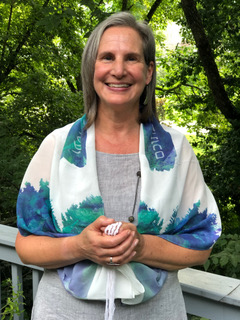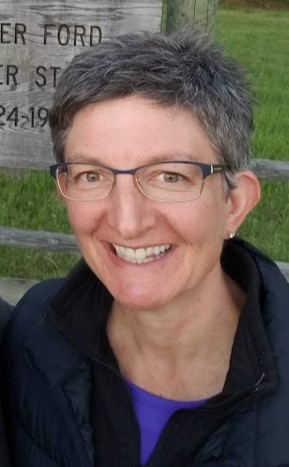Spiritual Leadership
Rabbi Jessica Shimberg
 |
Rabbi Jessica Shimberg Bio
In 2021, Rabbi Jessica Shimberg traveled to the Flathead Valley to lead High Holy Day services for Glacier Jewish Community/B'nai Shalom. The congregation fell in love with Rabbi Jessica and she fell in love with the congregation and Montana. For the Jewish year of 5784, Rabbi Jessica Shimberg will serve as the spiritual leader of Glacier Jewish Community. While Rabbi Jessica lives full-time in Washington, D.C., she will fly to Montana a number of times throughout the year as well as serving as the congregation's rabbi, teacher, and pastor remotely.
My Jewish journey, like many spiritual paths, is not a linear one. When I was seven, the first woman rabbi in North America was ordained within Judaism’s Reform movement. As a kid, Jewish family and congregational life as well as summers at Jewish camps awakened a level of interest and enthusiasm for Judaism’s rich liturgy and music that foreshadowed my rabbinic pursuits.
As an undergraduate at Brandeis University, however, when I had ample opportunity to pursue Judaic studies, I experienced, for the first time in my life, harsh judgment around different levels of religious observance – a practice I now refer to as “Jews out-Jewing” one other. This judgment and siloing of denominations (rather than a “big tent” approach to Jewish practice and learning) was alienating to my young and sensitive soul and turned me away from Jewish activities and community on campus.
Instead, I nurtured twin passions for musical theater and political activism. In the career that preceded my mid-life calling, these passions served me well. Upon graduation from The Ohio State University College of Law, I served as an attorney, mediator, and facilitator of conflict transformation, assisting others in learning and utilizing collaborative approaches to systemic and interpersonal disputes. My volunteer efforts continued to involve singing, theater, and social justice activism.
A lifelong learner, several books read one summer inspired me to design a monthly ritual to celebrate Rosh Chodesh (the new Hebrew month/new moon). This became a popular occurrence in my congregation and rekindled my love-affair with liturgy, soulful music, and cultivating meaningful Jewish experiences for community. In 2006, I was central to the formation of The Little Minyan, a chavurah that grew into a central Ohio congregation ~ Kehilat Sukkat Shalom. We were a small group of committed dreamers who created a grassroots kehilah/community. We designed a highly participatory model rather than the hierarchical structure of the synagogues we had experienced. In 2009, we very intentionally affiliated with the Reconstructionist movement (known today as Reconstructing Judaism), and later with ALEPH, the Alliance for Jewish Renewal.
I continued to develop my spiritual leadership skills, and in 2010, enrolled in an intensive training program for congregational worship leaders (DLTI – Davenen Leadership Training Institute) designed and run by rabbinic and cantorial leaders of Jewish Renewal. This immersive experience allowed me to finally clearly listen and pay attention to my rabbinic calling. I had “heard” this calling earlier in life; and it had continued to influence my life’s journey, relationship with Judaism, and sense of the sacred over the decades. In truth, I had wanted to be a rabbi (or hazzan/cantor) from my earliest memories of Jewish prayer, but it wasn’t until 2011 that I had the holy chutzpah to trust my kishkes and take the leap of faith. I joined the ALEPH Ordination Program to grow into the role I was already beginning to serve with the Kehilah. The growing community nourished their “home-grown emerging rabbi” in reciprocal appreciation for my energetic stewardship. The children of the Little Minyan Kehilah and many of their parents soon began to call me “rabbi Jessica,” a title bestowed with love and appreciation. Publicly, however, I declined this title and honor until January 7, 2018 / 20 Tevet 5778, when I received s’micha (transmission of the sacred capacities of Rabbi, teacher of Torah, pastoral counselor, and guide) from my teachers in acknowledgement of their confidence in my skills, appreciation of my talents, and delight to call me a colleague.
My “rabbinistry” has evolved around assisting Jews who feel ambivalent about or even alienated from the Judaism of their youth in renewing a meaningful connection with Jewish values and practices. In addition to working with Jews, I love any opportunity to engage and learn with those who feel drawn to Jewish wisdom and faith tradition. This includes those who were born and raised within other religious or secular paths and now live in loving relationship with a Jew, and those who feel drawn to convert to Judaism. Helping people to find value in a connection with the divine sparks of their Jewish journey is an intuitive strength I am honored to share.
I also find deep meaning in the “Torah of the public square,” addressing social and environmental justice issues through a spiritual lens. I have worked for many years, through T’ruah ~ the Rabbinic Call for Human Rights, and in alliance with the Coalition of Immokalee Workers, to address human rights abuses faced by agricultural workers, as they have grown a vibrant food justice movement. This work has led to increasing awareness of consumers’ power to exert influence on corporate practices and root out injustice. In addition to my involvement in food justice issues, I have worked to focus greater attention to the climate crisis and action around environmental justice and Earth care. I love to talk to folks about eco-kashrut practices and Judaic values that teach and support a way of living with a focus on sustainability and planetary health and balance. This and other endeavors are also opportunities to create meaningful collaborations in both Jewish and interfaith contexts. I adore the dynamics and generosity of interfaith work and has put my current political privilege in America to work to ensure marginalized people and communities to have a greater voice. Local and national issues of immigration have been a large part of my post-2016 work.
Although I love being called “rabbi,” my favorite earned title is “Mom,” the name I’m called by two young men I admire greatly and who continue to teach me about parenting and how to tend important relationships. Both have completed college and are enjoying meaningful work in Ohio and Wisconsin.
I am also a daughter who accompanied her Mom, z”l, and Dad through prolonged terminal illness, a sister and sister-in-love, and part of a blended family. These roles and the ways in which they require compassion, courage, patience, fortitude, forgiveness, and self-care continue to inform my “rabbinistry” daily. My friendships as well as the connections made each day with complete strangers are powerful forces of illumination, comfort, and joy.
In 2020, as the pandemic was transforming our lived reality, I moved to Nashville, Tennessee, to marry my beloved, Eric Stillman, who served as the CEO of the Jewish Federation and Jewish Foundation of Nashville and Middle Tennessee. As I transitioned to a new community during a global pandemic, my ritual artistry grew to encompass my creative outlet of braiding 100% natural beeswax Havdalah candles (#HavdalahHappiness). Eric and I were married during the pandemic in the 38 minutes just after making Havdalah between Shavuot/Shabbat and the coming week, and just before the city-wide curfew in Nashville as the country protested and counter-protested in reaction to the murder of George Floyd and so many other people of color at the hands of police. Through the miracles of modern technology, we were able to share our wedding with 300+ guests, though just seven people stood in the sanctuary. Our blossoming and b’shert partnership is planted in the rich soil of mature, unconditional love, appreciation for their abundance of blessings, and a shared enthusiasm for doing Jewish, professionally and personally. As our country wrestles with challenging issues and the polarity of politics, circumstances allowed us to leave the deeply red blanket of White Christian nationalism stifling the voices of so many in Tennessee. Settling in the District of Columbia, I am thrilled to be living and working at the crossroads of many cultures, backgrounds, and ideas as I shape the trajectory of my work with individuals, couples, families, and groups in the DMV (the District, Maryland, and Virginia).
Founding Rabbi Francine Green Roston
 |
Articles |
Rabbi Francine's Bio
Francine Roston moved with her family to the Flathead Valley in the summer of 2014. She left a full-time congregational rabbinate in New Jersey in order to create a life in Montana that was more balanced. After a year of getting to know the Jewish community, Rabbi Francine led the formation of Glacier Jewish Community/B'nai Shalom in the summer of 2015. After eight years, she is retiring from the congregational rabbinate and pursuing other spiritual outlets.
During her rabbinate, Rabbi Francine served in three New Jersey congregations and learned a great deal about community-building, working with lay leadership and remaining resilient in the face of the many ups and downs of rabbinical life. In 2005, she broke the “stained glass ceiling” when she was hired by Congregation Beth El in South Orange, NJ. Click here to see article. Rabbi Francine became the first woman in the Conservative rabbinate to serve a congregation larger than 500 member units.
Previously she served six years as the solo rabbi of Congregation Beth Tikvah in New Milford, New Jersey and her first year after ordination as an assistant rabbi in Livingston, New Jersey. Rabbi Francine received rabbinic ordination in 1998 from the Jewish Theological Seminary of America in New York. From 2011-2013, she was an adjunct professor at the JTSA in practical rabbinics and mentored senior rabbinical students preparing for ordination.
Throughout her rabbinate, Rabbi Francine has been involved in the Jewish, interfaith and humanitarian organizations. She advocated for equality for women and marriage equality in New Jersey. Click here to see article. Francine is a CLAL Rabbi Without Borders, a participant in the first Clergy Leadership Cohort of the Institute for Jewish Spirituality, a mentor in the Clergy Leadership Incubator program and she is working towards certification as a Mindfulness Meditation teacher. In 2017 Rabbi Francine was honored as a Human Rights Hero by T'ruah: The rabbinic call for human rights.
In the Flathead Valley, Francine volunteers regularly as a Super Advocate with the Abbie Shelter Helpline and a citizen scientist in Glacier National Park. She also supports the activities of Love Lives Here in the Flathead Valley and speaks out whenever hatred or violence threatens the community.Click here to see article.